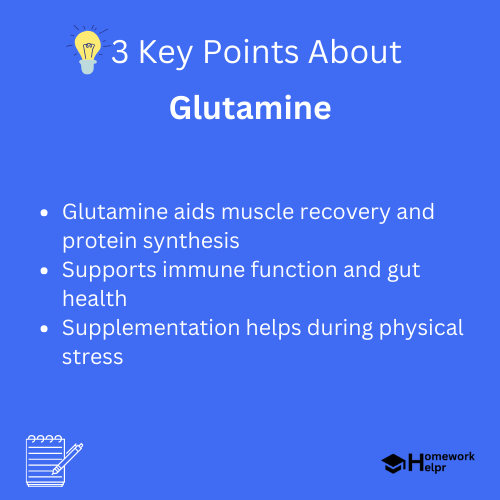📝 Summary
Glutamine is a conditionally essential amino acid that plays a vital role in various physiological processes, including protein synthesis and immune responses. It is essential for muscle growth and recovery, serves as an energy source for cells, and helps maintain gut health. Athletes often benefit from glutamine supplementation, particularly during intense physical activity, as it may enhance muscle recovery, boost endurance, and help regulate nitrogen balance. Sources include meat, fish, dairy, and legumes. Consulting healthcare professionals is recommended for safe supplementation.
Understanding Glutamine: The Super Amino Acid
Glutamine is one of the most abundant amino acids found in the human body. It plays a crucial role in various physiological processes, including protein synthesis and immune response. Whether you are an athlete looking to enhance your performance or someone interested in maintaining overall health, understanding glutamine and its benefits is essential.
What is Glutamine?
Glutamine is classified as a conditionally essential amino acid. This means that while our bodies can produce it, there are certain circumstances—such as intense physical activity or illness—when our bodies may need additional glutamine from external sources. It is vital for various bodily functions, including the production of other amino acids and the regulation of nitrogen balance.
Definition
Amino Acids: Organic compounds that combine to form proteins. They are building blocks of life.
Conditionally Essential: A term used to describe amino acids that are usually produced by the body but must be obtained from food during times of stress or illness.
The Functions of Glutamine
- Protein Synthesis: Glutamine plays a key role in the synthesis of proteins, making it essential for muscle growth and recovery.
- Energy Source: It serves as an energy source for cells in the intestines and immune system, helping to maintain gut health.
- Balancing Nitrogen Levels: Glutamine helps regulate nitrogen levels in the body, which influences various metabolic processes.
- Supporting Immune Function: It is crucial for the proliferation of lymphocytes, a type of cell that plays a significant role in the immune response.
This amino acid is especially important for athletes and those who engage in rigorous physical activities, as it supports muscle recovery after intense workouts. When the body is under stress, our glutamine levels can drop, which is why supplementation may be beneficial.
Sources of Glutamine
Glutamine can be obtained from various dietary sources. Here are some food items rich in glutamine:
- Meat (chicken, beef, pork)
- Fish (salmon, tuna)
- Dairy products (milk, yogurt, cheese)
- Nuts (almonds, walnuts)
- Legumes (beans, lentils)
- Eggs
For those who may find it challenging to obtain enough glutamine through diet alone, supplements are also available. These can provide an easy way to ensure you are meeting your body’s needs.

Health Benefits of Glutamine
Beyond its role in muscle recovery and protein synthesis, glutamine offers several other health benefits:
- Gut Health: Glutamine is a crucial fuel source for intestinal cells, promoting the integrity of the gut lining.
- Stress Management: It helps reduce cortisol levels, the stress hormone, supporting emotional well-being.
- Enhanced Recovery: Glutamine supplementation may reduce muscle soreness and hasten recovery after exercise.
Through these benefits, glutamine contributes to an overall improved quality of life, particularly for individuals engaged in high-intensity sports or struggling with digestive disorders.
❓Did You Know?
Glutamine can constitute up to 60% of the free amino acids found in the muscles, making it a powerhouse amino acid!
Glutamine and Exercise Performance
For athletes, maintaining optimal performance is key. Glutamine plays a significant role in this regard. During intense exercise, glutamine levels can take a hit, leading to muscle breakdown and fatigue. Supplementing with glutamine is believed to:
- Improve muscle recovery time
- Boost endurance
- Reduce the risk of overtraining syndrome
Examples
A marathon runner might take glutamine post-race to help repair muscle tissue and quicken recovery time.
How to Supplement with Glutamine
If you decide to take glutamine supplements, it‚’ essential to follow the dosage recommended by health professionals. Here are a few tips:
- Start with a smaller dose, around 5 grams, and assess how your body responds.
- Consider taking glutamine post-workout for optimal recovery.
- Always consult with a healthcare provider before beginning any new supplement regimen.
While glutamine is generally safe for most people, excessive dosages may lead to side effects such as gastrointestinal upset. Thus, moderation is key.
Potential Side Effects of Glutamine
While glutamine is beneficial for many, there are potential side effects to be aware of, especially if taken in high doses. Some individuals may experience:
- Stomach upset
- Nausea
- Headaches
Definition
Gastrointestinal Upset: Discomfort in the stomach or digestive tract, often leading to symptoms such as bloating, nausea, or diarrhea.
Conclusion
In summary, glutamine is a versatile and significant amino acid with vast implications for health, fitness, and recovery. From contributing to protein synthesis to supporting gut health and immune function, it is no wonder that glutamine has become a popular supplement amongst athletes and health enthusiasts alike.
Incorporating glutamine-rich foods into your diet or considering supplementation can lead to enhanced performance and overall well-being. Always remember to consult with a healthcare professional for personalized advice tailored to your unique needs.
Related Questions on Glutamine
What is glutamine?
Answer: Glutamine is a conditionally essential amino acid.
Why is glutamine important for athletes?
Answer: It aids muscle recovery and reduces fatigue.
What are common food sources of glutamine?
Answer: Sources include meat, fish, dairy, and legumes.
What side effects can occur from glutamine?
Answer: Potential side effects include nausea and stomach upset.
